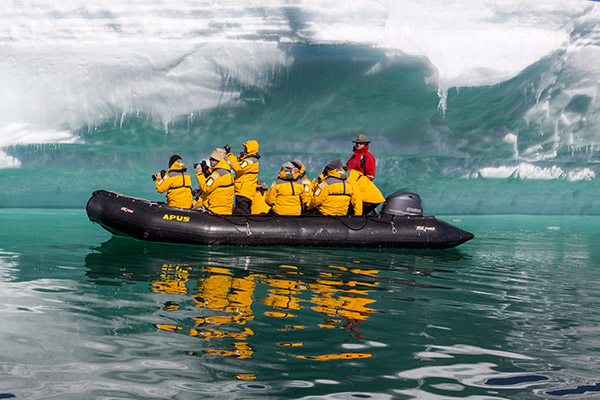Visitors tour Antarctica in January. According to Tuniu, a travel website,
in the past Spring Festival, about 10 Chinese visitors, who are mostly from Shanghai, booked tours to the continent.
Despite a sluggish world economy, the expanding group of wealthy Chinese, especially millennials, is showing a bigger appetite for luxury travel, adding a bit to the members' spirit of adventure.
According to The Chinese Luxury Traveler 2017 Report-jointly released on Monday by Shanghai-based Hurun Re-search Institute, which observes the rich, and International Luxury Travel Market Asia-the average upscale traveler spent 380,000 yuan ($55,855) on family travel last year, 220,000 yuan of which was devoted to shopping, up 57 percent year-on-year.
This seventh report released by the two organizations covers wealthy travelers from 12 Chinese cities. The survey polled 334 affluent Chinese with an average personal wealth of 22 million yuan.
In terms of accommodation budgets, the younger generation, who were born in the 1980s, had a budget 3,325 yuan higher than others, up 7 percent from 2015.
However, private short-stay rentals, like those provided through Airbnb, had not won equal favor among wealthy Chinese tourists. When asked if they would consider such service, 28 percent of those surveyed said no and 10 percent said it was highly unlikely.
Another 31 percent showed a neutral attitude. The lack of top-tier services at the private residences is the main reason for the luxury travelers' indifference.
Adventure travel will be the theme in the next three years, according to the survey, with around-the-world travel, polar expeditions and outdoor adventures the most popular. The generation born in the 1980s shows greater interest in these areas. About 36 percent of these young, wealthy tourists plan to visit Africa in 2017, up from the 23 percent in 2016. Meanwhile, 32 percent of them expect to fly to polar areas this year, up from the 17 percent a year earlier.
According to HHTravel, a luxury travel brand under China's largest online travel agency Ctrip, the number of consumers interested in polar trips with an average personal wealth of at least 10 million yuan has grown since 2014. Meanwhile, travel packages which include hunting in Africa promises room for growth among wealthy Chinese.
Andy Edwards, global director of brand and marketing communications of travel booking firm Agoda, also agreed that wealthy Chinese travelers seek adventurous, undiscovered destinations rather than going to common recreational resorts.
"As these high-end travelers become increasingly independent in terms of wealth, cost considerations weigh less heavily and they are able to travel more freely to the places they favor the most," said Rupert Hoogewerf, chairman and chief researcher of Hurun Research Institute.
"These choices are highly significant, as they often set the trend for future waves of tourism, with these high-end pioneers setting the benchmark," he said.
